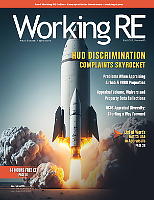 |
> The Appraiser Coach
> OREP E&O |
Interview with Jessica Stokesberry: The Do’s and Don’ts of Government Appraisals
by Kendra Budd, Editor
Appraisers don’t have to be strictly limited to residential mortgage appraisals. In fact, even the Government needs appraisers! Government appraisal work can be a little difficult to understand, or even more daunting to get started with.
What are the differences between residential mortgage appraisals and government appraisals? Why would an appraiser consider moving over? What exactly do government appraisals entail? Is there more job security in them? Well, Bob Hartner, Appraisal Manager with Sound Transit and Jessica Stokesberry, Chief Appraiser at Washington State Department of Transportation (WSDOT) were two of the speakers at 2023’s Seattle Chapter of the Appraisal Institute Fall Conference, where they shared some of the do’s and don’ts of government appraisal work, for those who were thinking of joining in the field.
I sat down with Stokesberry to learn more about her insight on government appraisals. Here’s what we learned.
Q: What is the best way for prospective appraisers to obtain government work? Is it by contacting agencies? Applying for pre-approval? Right-of-Way firms? Local Attorneys? Or a combination?
Stokesberry: Every government agency contracts appraisal works differently. The first step is to contact the agency you are interested in doing work for directly and find out about their contracting process. It may involve applying for an approval list, waiting for a public RFP process, or just letting the right person know that you are qualified and available for work. Appraisal and appraisal review work may be subcontracted through right-of-way firms, although individuals often are still required to be on the pre-approval list. Eminent domain attorneys may also directly contract with appraisers.
Washington State Department of Transportation (WSDOT) has separate pre-approval lists for appraisers and appraisal reviewers. The minimum qualifications include state licensure, a minimum of two years of eminent domain experience, and passing a test. Inclusion on the list does not guarantee work but allows an individual to bid on work for WSDOT or local agencies.
Q: You said at the Appraisal Institute conference that the three sections of the “Do” category were, (1) obtaining work, (2) scoping your assignment, and (3) completing the assignment. Could you go into detail about scoping the assignment?
Stokesberry: Government agencies differ in terms of the appraisal standards that must be followed when completing assignments. In the United States, adhering to USPAP is universal, and following the Uniform Relocation Act (URA) is universal when completing assignments for acquisitions under threat of condemnation, but after that there is variance: a particular client may require adherence to the Uniform Appraisal Standards for Federal Land Acquisitions (Yellowbook), the standards of a funding partner (e.g. FHWA, FTA), or maybe even their own proprietary standards. The appraiser should ask what standards need to be adhered to in the assignment, and then familiarize themselves with those standards while scoping out the assignment.
Scoping the assignment is an important step to identify the valuation problem to be solved. Often, in right-of-way appraising a partial acquisition is needed by the acquiring agency, so identifying what rights will be acquired is crucial. The type of right needed will also need to be identified—fee, easement, temporary easement, or other.
Q: What is in the Scope of the Assignment and the Property Title Report?
Stokesberry: The Scope of the Assignment lays out the type and extent of research needed to solve the appraisal problem at hand.
Understanding a property’s title report really gets down to what legal rights the appraiser is being asked to value: valuing a property with no encumbrances may be a much different appraisal problem than valuing a property’s servient estate, subject to the rights of a neighboring property. In order to complete an assignment, the appraiser needs to know how the subject property’s “bundle-of-rights” has been divided, and then which “sticks” within that “bundle” they are being asked to appraise.
Q: What is it like working on properties with multiple interest holders? How might this differ from residential appraisals?
Stokesberry: Multiple interest holders in a single property can potentially change the appraisal problem at hand. For example, when completing an appraisal of a property with multiple interest holders for eminent domain purposes, the “Unit Rule” may dictate that the property being acquired be valued and treated as a single “Unit.” However, in certain cases, like when there’s an acquisition impacting appurtenant easements benefitting off-site parcels, the appraisal assignment may turn into multiple appraisals of multiple impacted “Larger Parcels.”
Transportation projects sometimes require the appraisal of a home, but eminent domain appraisals differ from financing appraisals in a number of ways. For example, transportation appraisals are often reported in a narrative report format instead of as a form report; they are often “before and after” appraisals—there needs to be a determination of personal property v. real property, and oftentimes adjustments to comparables are qualitative instead of quantitative.
(story continues below)
(story continues)
Q: Something you said at the conference is that, “appraisers should never be afraid to ask questions.” Why is this sentiment so important?
Stokesberry: Asking questions leads to better efficiency in delivering a usable valuation product to the client. A robust discussion with your client may help clarify expectations and methodologies. Different government clients may have different expectations. Asking questions can lead to the agency gaining more clarity in their own project and a better understanding of impacts on surrounding properties.
Appraisals completed for government agencies are oftentimes complicated. The appraisal problem at hand is often not as straightforward as valuing the fee simple interest in a property. Asking questions up-front is critical to having an understanding of what it is you are appraising, as well as the purpose and intended use of the appraisal. Asking questions up-front can also save the appraiser valuable time in not having to chase down answers that are already known, and also improve the quality of the work-product.
Q: What is a kick-off meeting, and what does it entail?
Stokesberry: A kick-off meeting is a meeting to orient the appraiser as well as the rest of the real estate team on what the project entails. It will often allow the whole project team (including the appraiser) to talk through the details of each parcel in the project and begin brainstorming solutions to potential issues. The meeting may be high-level or may get weedy in discussing specifics.
Q: What are some of the biggest mistakes an appraiser can make doing government work? What are the major “DO NOTS”?
Stokesberry: One of the biggest mistakes an appraiser can make when doing government valuation work is not to be familiar with the applicable regulations. For example, the regulations informing requirements for a job with Fish and Wildlife will be significantly different than for the Department of Transportation. For eminent domain work, it is vital that you’re familiar with Federal regulations as well as state laws; not all damages are compensable—missing the mark on highest and best use and not identifying the need for lease-back fair market rent.
Another is not asking questions of the client. The best appraisers for this type of work are oftentimes the ones who ask the most questions and not try to complete the assignment in a vacuum.
Q: What are some benefits of switching to government work?
Stokesberry: First, diversifying your practice. There’s a wide range of project types; right-of-way work is unique and challenging. It could be a good way to get your foot in the door if you’re seeking staff appraiser work with a public agency. There are many interesting niches in government work. It is also not as impacted by the “ups and downs” of the overall real estate market as other types of appraisal work.
Q: Do you have anything else you would like our audience to know?
Stokesberry: Working for government agencies is a fantastic way for appraisers to differentiate themselves from their competition, work on challenging appraisal problems, and also to maintain a steady workload during the “ups and downs” of the real estate market.
Final Thoughts
If an appraiser is in need of diversifying their practice, then government work is a great place to get started. Yes, there are many more regulations and procedures that you will need to be aware of—but imagine the boost to your business once you get the hang of it.
More importantly, now more than ever it is in an appraiser’s best interest to learn other ways to get work outside of residential mortgage appraisals. With the slowdown still lingering forward, diversifying your practice and client base might be a smart move. This can help you have a “plan B” if you’ve already had the experience. Government work very rarely slows down, but it is a competitive field.
Stay safe out there!
About the Author
Kendra Budd is the Editor of Working RE magazine and the Marketing Coordinator for OREP, a leading provider of appraiser E&O insurance—trusted by over 10,000 appraisers. She graduated with a BA in Theatre and English from Western Washington University, and with an MFA in Creative Writing from Full Sail University. She is currently based in Seattle, WA.
OREP Insurance Services, LLC. Calif. License #0K99465



